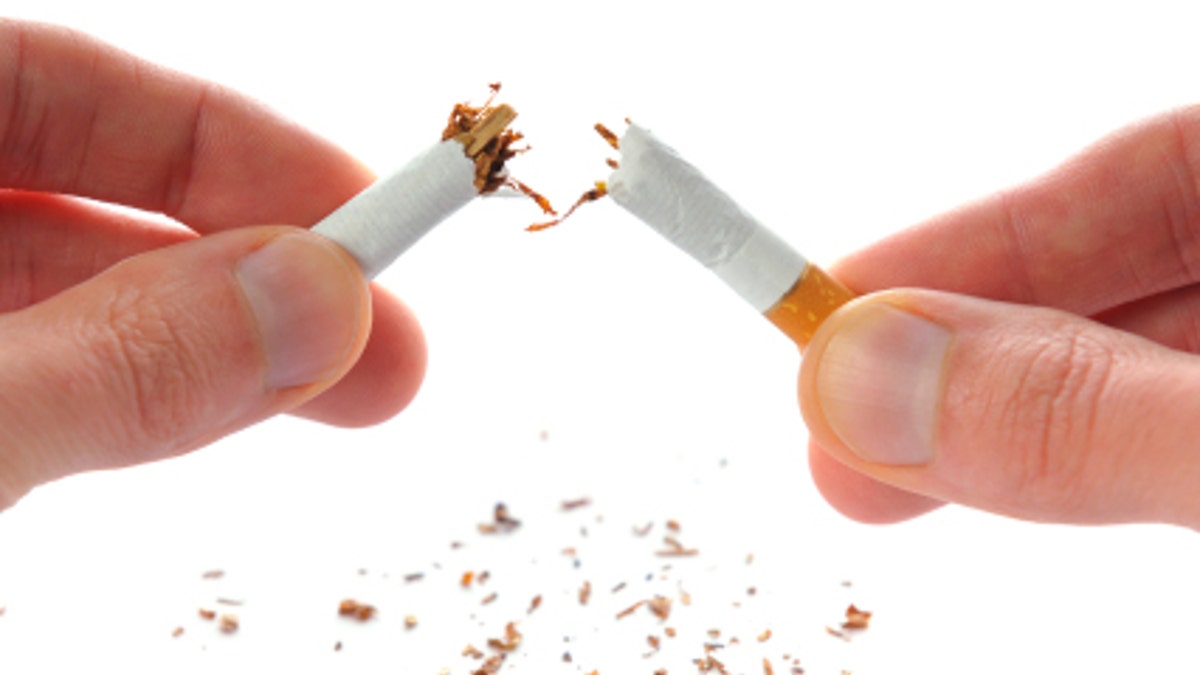
A mouth spray that delivers a dose of nicotine faster than patches and gums may help some smokers quit long-term, suggests a new study from Scandinavian and German researchers.
In a controlled trial lasting a year, they found that compared with a non-medicated "placebo" spray, the nicotine mouth spray helped more than twice as many smokers quit. One reason, the team writes in the European Respiratory Journal, could be rapid delivery of nicotine to the bloodstream to relieve cravings when they strike.
Nicotine replacement therapy (NRT) is one option for helping smokers kick the habit. And NRT in the form of patches, gums, lozenges and nasal sprays has long been on the market.
NRT mouth sprays are newer and not available everywhere, including the U.S.
The mint-flavored sprays are designed to give people a more quickly-absorbed dose of nicotine compared with gums and other forms of NRT, and to be less irritating than nasal sprays.
The mouth sprays can also be used at will to alleviate withdrawal symptoms, versus skin patches, for example, which deliver a steady dose of nicotine to the blood over the course of the day.
But little has been known about how well the mouth sprays work in helping smokers quit.
In the new study, almost 14 percent of smokers who used the spray for three months were abstinent at the one-year mark, versus about six percent of those given the placebo spray.
That's not a huge number. But the benefit relative to placebo was larger than what's been seen with other NRT products, said lead researcher Dr. Philip Tonnesen, of Gentofte Hospital in Copenhagen, Denmark.
Still, recent smoking-cessation trials combining intensive counseling and medication have come up with better overall numbers. They've suggested that about 25 percent of smokers can be cigarette-free at the one-year mark with medication -- whether NRT or the prescription drugs varenicline (Chantix) or bupropion (Zyban and generics) -- and strong support.
The lower rate in this study may be due to the "minimal" counseling offered to the trial participants, according to Tonnesen.
"There is an increase in quit rates with the intensity of support (counseling)," he told Reuters Health in an email.
The study involved 479 smokers who were randomly assigned to use the NRT mouth spray or a placebo spray (containing capsaicin to mimic nicotine's burn) for 12 weeks. They also got some brief advice on quitting when they made trips to the study clinics.
All study participants were told to use the spray whenever they would normally have a cigarette, or when they felt a craving for one, but not to exceed four sprays per hour or 64 sprays a day.
Abstinence was verified by breath and saliva testing.
Both nicotine-spray and placebo users reported reduced cravings over time, and both groups gained weight -- averaging 4.9 kg (about 11 lbs) in the nicotine spray group and 4.2 kg (about 9 lbs) in the placebo group by week 24.
Mild-to-moderate side effects reported by both groups, but more often by the nicotine-spray users, included hiccups, throat irritation, nausea, and salivating too much.
The study was funded by McNeil AB, which makes the Nicorette QuickMist mouth spray. Tonnesen and other researchers on the work have financial ties to McNeil AB and other NRT product makers.
In general, experts recommend NRT products as one option in the battle to quit smoking. But they also stress that many people need a combination of measures, and several different attempts at quitting before they finally succeed.
The American Lung Association (ALA) says that while some smokers can quit "cold turkey," the best bet for most is to try a combination of medication and some type of behavioral counseling.
An example is the ALA's "Freedom From Smoking" program, which is available online (www.ffsonline.org).
And NRT products are no "silver bullet," said Dr. Gregory Connolly, director of the Center for Global Tobacco Control at the Harvard School of Public Health.
In a recent study, Connolly and his colleagues found that in the "real world," NRT products may not be all that effective in the long term. Using several surveys of about 800 smokers, they found that among people who tried to quit over six years, those who used NRT products were just as likely to relapse as those who hadn't used the tactic.
That's not to say that NRT cannot help smokers, Connolly told Reuters Health in an email.
"I think we are not criticizing such products for their intended use, treatment of withdrawal," Connolly said.
But, he added, "Dependence on tobacco encompasses other factors -- factors that exist far longer than nicotine withdrawal and that, over the long term result in relapse."
Smokers who are highly motivated to quit, and get themselves out of the social environment that feeds their habit, may have the best chances of lasting success, according to Connolly.
Even with combination therapies, kicking the smoking habit is often an uphill battle. The ALA estimates that it takes the average smoker five or six serious attempts to finally quit.
And according to the U.S. Department of Health and Human Services, 36 percent of the nation's smokers try to kick the habit each year -- but only three percent succeed in quitting for six months or more.








































